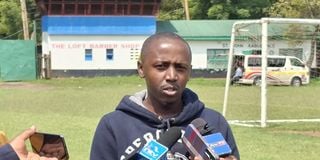How I was lured from Bahati, into a human trafficking syndicate in Myanmar

Samson Nderi Maina, a survivor of human trafficking speaks to the media during the commemoration of the world human trafficking day at Nakuru ASK showground on July 30,2025.
When Samson Nderi Maina left his home at Heshima, Bahati, in September 2024, he believed in the famous statement, “We left home to change home.’
Little did he know he was part of a human trafficking syndicate and would be sold to the highest bidder for services he had not subscribed to.
Maina was lured to Myanmar through what he thought was a customer service job in Thailand.
At 29, and already working as a supervisor, he was seeking greener pastures when he accepted what looked like a promising opportunity abroad. Instead, he found himself trapped in a scamming group.
“On arrival, I, and others who had also been accepted into the same job slept in a very decent hotel. The next day, we started an unending journey to what would be working in a scamming syndicate. At one point, they took our phones and formatted them, but later on, they seized them,” he recalls, adding that his name was changed to English and Chinese aliases.
In this job, Maina would scam what he believes were US citizens looking for properties. He and others from different nationalities being held did this through fake social media profiles created by their captors'.
"I was to pretend like I am a millionaire in America and approach the real estate agents using my Instagram profile that had a different alias, so just incase they asked for my photo, I would send the IG profile," he narrates.
To sweeten the deal, Maina says he was paid a 'basic salary' of Sh 90,000 in the first month.
However the second month he only got 15,000. Things got worse in the subsequent months where he got nothing.
Maina had already spent Sh. 250,000 with a three-month tourist visa and a promise of a one-year work visa in Thailand.
Instead of staying there, he was smuggled across the border into Myanmar, where none of his documents were valid.
“All the time we wanted to leave, we were being told to front 8,000USD to secure our release, which did not make financial sense,” he says.
During his stay, Maina recalls how they stayed in dorm rooms of eight people and slept on uncomfortable bunk beds.
"Although we had three meals a day, the food was mostly rice and a stew that was distasteful. We were only allowed to use the phones between 7pm and 9pm on a very shaky network, making it hard to communicate," he explains.
Luckily, Maina was able to alert his family back in Bahati of his situation prompting efforts to secure his release.
It took about seven months and multiple attempts through consulate channels before Maina was rescued with the help of the Kenyan government.
Luckily, an incident where a Chinese actor was abducted and brought to the scam city prompted a raid in the area where Maina was being held.
After the raid in February this year, Maina and about 7,000 others were taken to a detention center where they were officially linked to the ambassador who facilitated their return home.
Maina represents over 300,000 young people who were robbed of months- sometimes years- of their lives after being lured into deceptive opportunities that turned out to be trafficking traps.
His message to young people is to be aware of fraudulent labor recruitment schemes, especially those targeting youth with promises of quick success abroad.
“For anyone considering migration, do thorough background checks, verify agencies, and understand the legal requirements before leaving the country,” he emphasizes.
According to Miriam Njeri the chairperson of Survivors Network Kenya, there’s a serious gap in awareness in rural areas. People don’t know what to look out for.
“Migration isn’t bad. But people need to verify information. There are online tools now, even apps that can help,” she says.


